Tomorrow is a crucial COVID19 day. In Italy and beyond
It really is.
Welcome to another report, on the eve of a very important day, of what six weeks of lockdown do to the western country that COVID19 made a guinea pig for all others (The other reports are here).
Daily life now in Italy
At least two things were not celebrated yesterday: Rome’s2773rd birthday, and the opening of the biggest fair of made in Italy furniture. Salone del Mobile expected 450K visitors with tons of money to spend, many from China, but of course it was canceled, and its organizers are really, really worried: “Many furniture companies are, or heavily depend on, family-run activities that may never reopen, and need reopening NOW even more than money”.
Piedmont and Lombardy are still under siege, even if many ICU units now have some free beds, and contagion in Southern Italy seems somehow limited. My own personal biggest fear remains an outbreak like in Lombardy in Rome, Naples or Milan.
Ramadan will start tomorrow, and increase complexity worldwide. Here, it worries at least one social assistant of migrant children with special needs, because “lockdown already made these kids need more help than usual, and day fasting will make them even more restless”.
“Thou shalt not scare patients”. Allegedly, this is why nurses of the Trivulzio retirement home in Milan, now under investigation for many suspect deaths, were “ordered to not wear masks”.
Beach pipe dreams continue. After the beach reopening deliriums covered in my previous post, we have another proposal that is cheap and without plastic. It only applies to managed beaches with hefty entry fees, but is brilliant: just place beach umbrellas a bit more apart, and enclose them in ropes:

This will surely stop droplets, because beaches are the least windy places of the planet. When lockdown ends, people who cannot afford managed beaches will likely crowd as much as they can in the unmanaged ones that are accessible from land, unless the police blocks every access. Whoever can afford to reach the remaining beaches by boat will have no problem, and will do it in style:
Mask trikinis are where it’s at. The Bikineria shop of Porto Cervo is designing masks with the same patterns as their hand-made bikinis:

Are they stilish, or what?
The NARROWEST italian region won’t be left behind by its physical limits. The governor of Liguria proposed a mandatory minimum distance of two meters, not one, to reopen after lockdown. Still in Liguria, Carola (14) and Vittoria (11) successfully played quarantine tennis:
“Let’s play, window glasses be damned”
Mass must go on, thundered the priest celebrating in Gallignano to the Carabinieri arrived to interrupt it:

Since there were only fifteen people in 350 square meters of church, the officers agreed to wait until the end, then fined everybody for 270 Euros.
Grocery shopping follows the general mood:
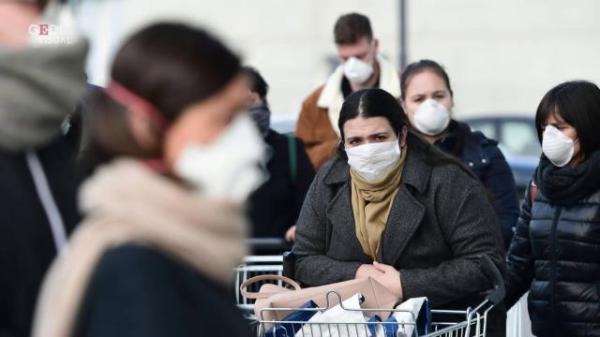
After the first weeks stocking mainly flour, pasta, potatoes and canned beans, Italians now seem to be comforting themselves by buying more chocolate, cold cuts and alcohol. According to the (single!) bottle of Limoncello and box of Tiramisu in my own fridge, that’s true. I’m still sad because I haven’t found any porchetta though.
Locked down children with Spinal Muscular Atrophy continue to receive physioterapy by their own parents, thanks to the tutoring they get from real specialists online.
Something troubling happened in Turin:
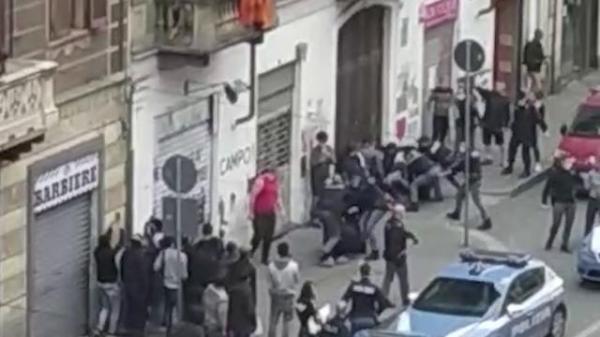
Apparently, the police had catched two people who had just stolen a necklace, and was just proceeding to arrest them. Seeing the scene, about eighty people, mostly anarchists squatting in a nearby building, went to the street to free the thieves, incited by someone yelling “let’s give the cops some of their own medicine”. Final result, six arrests, seven cops injured, hopefully zero contagions.
Sheeps make the news. To save money in these hard times, a resident of Turin bought a live sheep for 60 Euros. Then, he butchered it in his condominium’s courtyard, right under the eyes of co-residents locked at home for 6 weeks now, because someone butchered the wrong bat in China. Strangely, they were so upset that they denounced him. Another sheep was used as excuse for a pet walk in Palermo:
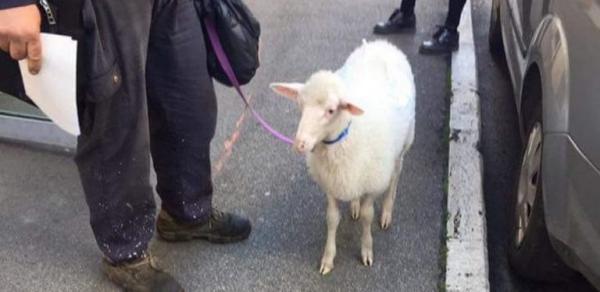
Then again, it seems walking a sheep was a thing in Sicily even before the lockdown.
Some city councils are REALLY too stressed. Over 200 small towns are opposing local 5G deployments, not because of the many, many REAL issues with 5G, but because it would be a co-cause of COVID19.
Elections are postponed, and youngsters are missing. Administrative elections have been postponed in seven regions and over one thousands towns, hopefully to autumn. Meanwhile, young people are missing. Politically, that is. It may be my own bubble, but I see much less discourse about post-COVID19 politcs from youngsters, than from people who will live much less with their consequences. Like UK with Brexit, somehow.
Soccer club managers live in a separate universe. Half the clubs of A League still wants to restart matches, while many players and club doctors see no way to do it safely.
Domestic violence goes just as predicted five weeks ago: in Milan, a man shot her ex partner who had accepted to host him “until lockdown ends”.
Nature goes on, giving advice. A small Etna eruption, a light earthquake in Lombardy and the biggest italian river already as dry as if it were August all say the same thing: “you know, making this society of yours a bit more robust may be a good idea regardless of pandemics”. Worldwide, a similar message just arrived in a much more dramatic, and urgent form.
Speaking of drought… national demand for irrigation machines has already risen, but factories that make them are still locked down by decree.
Father and son run for Darwin Award. First, they insulted someone, for spreading coronavirus by jogging without a mask. Then, they went close enough to punch him.
Germany sends mixed signals. In Bruxelles, it still plays bad cop. Internally, German car makers realize they cannot go back to normal if their italian suppliers of car parts collapse. Two german tourists canceled their booking in Sardinia, but told the hotel to “keep the account as a gift, with apologies for our shameful politicians”.
Feet demand care, too. Couples that had already started to cut each other’s hair are now learning ” how to make a professional pedicure at home":
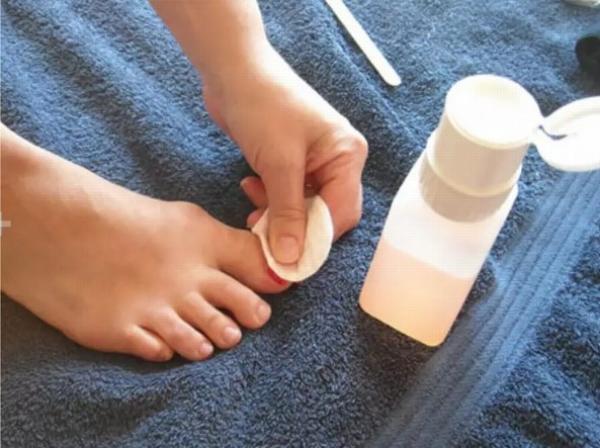
Coronavirus impacts on labor
Uber for farmers. Native farmers. Forced by lack of money on one side, and harvests rotting for lack of migrants on the other, some italians, and many italian farmers, take extreme measures: become, or hire, ITALIAN farm laborers.
Two nationwide farmers associations have created two online portals to make offer and demand meet, collecting over six thousands applications in the first three days. Luckily, both portals have English names (“AgriJob” and “JobInCountry”???) so applicants can still pretend they are applying for some internship in Oxford.
However, both italian labor laws, and unions, have a really hard time coping with the very concept of hiring temporarily people who nominally are still employeed, just without a penny because of the lockdown.
Riders are like employees, even under COVID19. On April 14th, a Court in Bologna ruled that online platforms delivering food or other products must give their riders personal protection equipment as if they were regular employees.
Gig economy news like these, combined with those that “the pandemic made Amazon vulnerable” make really interesting food for thought.
Contact tracing is hard to trace
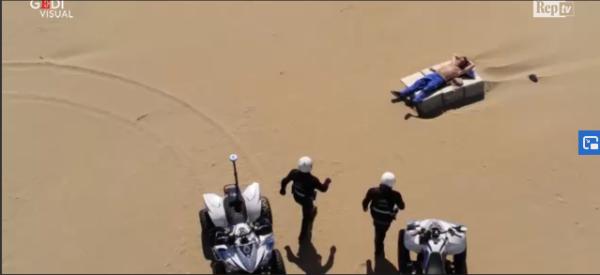
In some weird way, this image of a lonely beach-goer about to be ‘collected" by drone-led police sums up the perception of contact tracing feels as a generic drill and tool for permanent surveillance. Other major concerns are voluntarity, and unproven effectiveness:
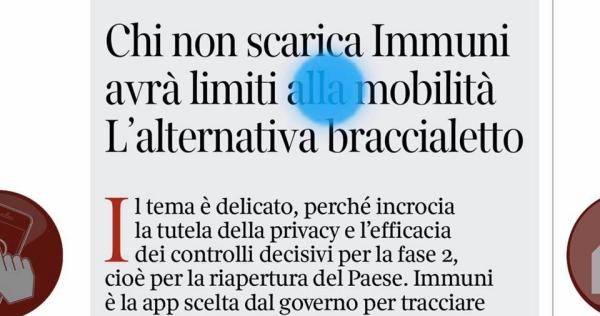
“whoever does not install the voluntary app will have restricted mobility”
As a minimum, when this is over we will need the technical and legal certainty that we can install or remove at will all the software running on our devices.
About effectiveness, “There is an absence of evidence to support the immediate national deployment of symptom tracking applications, digital contact tracing applications and digital immunity certificates." This is a major point of the Ada Lovelace report that, together with the 8 COVID19 privacy questions, many italian expert recommend as a good starting point for every digital measure to manage the outbreak.
An open letter against the risks and lack of effectiveness of app-based tracing got almost 200 signatures in two days, but that is not the only concern. Facebook decisions to ban anti-lockdown protests are as sound now, as they are warnings that the same could happen just as easily, and maybe be harder to spot, with any form of protest, on any issue.
Last but not least, all this happens in an Italy with a Data Protection Authority (“Garante Privacy”) and a Regulatory Authority for Communications (AGCOM) that are still waiting the appointment of new directors and boards).
Italian phase 2: post lockdown plans abound, and so does confusion
43 is the worst number, and Singapore the most worrying place. A testing campaign of almost all the residents of Vo’ Euganeo, one of the small cities most devastated by the outbreak, revealed that 43% of positive cases were asymptomatic. News of “a record 1,426 new cases, mostly among foreign workers” make happy those who want to kick “disease-carrying migrants” out of Italy.
These news may also mean that real lockdown, or really ubiquitous testing, may be the only effective strategies, until vaccines become widely available. Something that, just said an immunologist, “may not happen before a couple of years”. An epidemiologist also remembered that, in order to begin a “phase 2”, other numbers besides R0 should be low, from the one of red zones to the number of cases of unknown origin.
All this resolves to three interlocked, crucial issues for Italy right now. One is how, when and where to end lockdown. The second is how to get money, or at least relief from debt, in Europe or anywhere else. The third is how to make a country like this compatible with pandemics.
Speaking of lockdowns, the governor of Campania wants to close his region if the others “reopen too early”. The governor of Lombardy insists all regions must follow the same schedule, and told his Campanian colleague that "[unlike you] we will not close our doors to all the people who’ve always come here from Southern Italy because our healthcare is better”. Pretty rich statement given the circumstances, but so he said.
The major of Milan proposes a “city reopening plan” based on everybody working in shifts, or otherwise changing their schedules: two shifts for schools (or at least entrance spread over two hours), shops open in the evening, and quotas both on hourly subway accesses, and wagon occupancy rates.
On Facebook, instead (yes, Facebook. Maybe the government website had coronavirus), Prime Minister Conte (evidently with data from Vo and Singapore in mind), wrote that “I would like to just restart everything now, but it would be irresposible”, called for national coordination and promised a new detailed plan by the end of this week. The same day, the italian representative to the WHO said “it is absolutely too early to start with Phase 2”.
Money-wise, Conte told a german newspaper that the whole EU needs Eurobonds and that, before opposing them, Germany should justify its beyond-EU-limits trade surplus, and Holland its fiscal dumping laws.
“Italy will keep getting back door bailouts from the ECB. There will be no default”. Says Quora, so it must be true.
Pandemic-proofness? In the medium and long term, making Italy really resistant to the next, unavoidable pandemics clashes directly with almost all its places and history (but most other countries are not in really better shape!). To get there, argues a recent article, Italy should adopt urban design guidelines that would make Baron Haussman an incompetent amateur:
- social distancing and reduction of crowding possibilities
- containment and management of intraurban mobility
- increase of local supplies
From an urban redesign standpoint the first two points, which conveniently also make urban riots much harder, just need bulldozing some 80% of italian downtowns, starting from Rome. The third, instead, may have many more positive than negative side effects, and is much easier to accomplish: we’d just have to get rid of Ikea, Auchan and all the other multinational companies based on the opposite business model.
Let’s see now some general issues on which, again, today’s Italy plays the guinea pig for the whole (western) world.
Mobility is THE problem. Both for humans, and for viruses
Mobility is not some stand-alone thing, but what makes almost all other activities possible. Any plan to “manage mobility” is not a proposal to reschedule trains, but a call for (sometimes unreal) organizational changes at all levels and spheres of life.
“Smart” working as it is in these days is just emergency working: a source of data, not a permanent solution, on how to reduce commuting by reinventing work.
Car sharing? “It’s pretty hard to imagine that the first thing we’ll do after the quarantine will be to dive into the closest car into which “some complete stranger was breathing in, just minutes before”.
A rule proposed here in Rome would make buses or subway wagons carry only passengers seated, with at least one empty seat between two passengers. This is an 80 / 90% capacity reduction that would lead to fights. Who gets the last seat on the next bus? The guy with a dentist appointment after ten days of inflamed abscess (because dentists could only receive by distanced appointments!)? Or the unemployed going to the first job interview in six months? The only effective ways to avoid fights and avoid overcrowding in subway stations may be mandatory booking of trips, just like with planes. Indeed, something similar to what I suggested years ago for the Fiumicino Airport has just been actually proposed in Turin. But even booking would not change the main issue: there are not enough hours in a day to spread all the trips that are needed for all the urban activities of 2019.
The main advantage of capacity limits on public transportation, plus multiple shifts in all schools and workplaces that may afford them may be to make much other regulations unnecessary. If everybody works or is in class at different times, there is no way in hell that a pre-existing family or group of friends can “go out TOGETHER” more than once per semester, and consequently much less need to regulate restaurant tables or theather seats.
One of the main reasons why the pre-COVID world sucked, regardless of economics, was loneliness, and lack of quality time together. This just makes it worst.
Let’s talk children
Thanks to online lessons, “many parents are just discovering that the teacher may not be the problem” (Bette Midler). But certain proposals and requests to reorganize schools are really worrying.
1200 italian parents, including many pediatricians, teachers and psychologists, are worried because of the marginal role and space that schools seems to have in public plans for next autumn.
Expectations that school, and in general all structured, adult-managed activities should completely fill the days of children and teenagers are really dangerous. Those days were already screwed by overregulation, and overparenting, and performance anxiety, before and without COVID19.
Maybe the first thing parents and education experts should worry about for next autumn is how to give more, not less space, to sensible parenting, and really free time for children.
Let’s talk oil
“The oil price collapse is a bad omen for much worse things to follow.. We don’t come back from this one”.
“How this finally plays out, is partly a game of endurance between Saudi, Russia and the US [but] against this backdrop the urgency to ameliorate climate change persists”.
These statements were written here and here exactly one month ago, when crude was about 22 USD/barrel. Since my previous post, crude (temporarily) went as low as MINUS 37 USD, “as desperate traders paid to get rid of oil”. I’d guess the likely increase in demand of plastic packaging amd single-use tools for hygiene purposes may absorb just a (tiny) part of that offer.
Fact is, even with COVID19 filling everybody’s brains, Italian media find space to report that world demand for oil dropped 30% in April only, will stay low due to less flights and more telecommmuting, and weight on Trump’s re-election, which “depends on shale oil states as Texas, Pennsylvania and Ohio, hard hit by price dumping led by Putin”. The first gut reaction of Italians, and probably everybody else, is “why don’t they lower gas prices, then?” One optimist answer may be “because less mobility equals less contagion, and even later gas tax money would be better used to convert Italy to electric cars, and generally to a more resilient economy”.
Meanwhile, in Africa…
- Supply chains and money flows are broken by closed Chinese ports, and reduced exports to Europe
- “swarms of locusts, some the size of cities” roam the Horn of Africa
- continent-wide recession, widespread food crises, and healthcare failures are all but certain
- and all this is almost ignored by most european media and policymakers (have you noticed how the three bullets above come from arab or catholic sources?)
Then again, why worry? After all, it’s just 1.2 billion human beings, on the other side of a sea so vast it can be crossed with rubber dinghies.
Asia isn’t in much better shape, by the way. Even there, conflicts (just like pandemics) may “arise from excessive interdependence”.
The least exact thing I read this week, and a request for tomorrow
The least exact thing I read is “Pandemics are not political things, they must be dealt with by science”. Science, sure. But science must inspire politics.
Tomorrow (April 23rd) the European Council will meet to discuss how to avoid collapse of the Eurozone. It would be great if, as a minimum, they avoided any measure as clueless as forcing airlines to fly nearly empty planes to get bailout money, and if it followed the example of Poland and Denmark, excluding tax haven companies from coronavirus relief schemes. It would be even better if it gave serious attemption, or at least produced concrete counter-arguments, to “money to people” measures like those mentioned in my previous post. If you are european and agree, please do share this post with your state and EU representatives.
PS.: like everything else here, all this COVID19 coverage and commentary is and will remain available as it is now, that is without paywalls, or intrusive cookies or advertising. If you find it useful this effort and my other work, please support it, with donations or in other ways.
PPS: to translate this or my other coronavirus reports, please email mfioretti@nexaima.net.
Who writes this, why, and how to help
I am Marco Fioretti, tech writer and aspiring polymath doing human-digital research and popularization.
I do it because YOUR civil rights and the quality of YOUR life depend every year more on how software is used AROUND you.
To this end, I have already shared more than a million words on this blog, without any paywall or user tracking, and am sharing the next million through a newsletter, also without any paywall.
The more direct support I get, the more I can continue to inform for free parents, teachers, decision makers, and everybody else who should know more stuff like this. You can support me with paid subscriptions to my newsletter, donations via PayPal (mfioretti@nexaima.net) or LiberaPay, or in any of the other ways listed here.THANKS for your support!